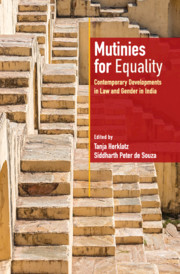6 - Armed with the Constitution: Feminist Litigation on Indian Family Law
Published online by Cambridge University Press: 08 June 2021
Summary
Introduction
‘I took the matter to court to establish a principle,’ said Mary Roy, mother of the well-known author Arundhati Roy, to describe why, in 1984, she had approached the Indian Supreme Court to challenge the constitutionality of Christian inheritance law. Roy wanted the ‘common Christian girl’ to benefit from a judgment that, so she hoped, would strike down as unconstitutional a discriminatory provision that granted women lesser inheritance rights than men. In this chapter, I look at cases where individual women like Mary Roy, women's organisations and feminist lawyers have approached the courts to have discriminatory provisions in religion-based family law (usually referred to as personal laws) struck down as unconstitutional. I speak about feminist litigation in this context.
The topic of feminist litigation has so far featured largely in scholarship on countries in the Global North. Little research has dealt in depth with feminist legal activism in Global South countries like India. On the other hand, there is a rich body of scholarship that deals with the activist role of the Indian higher judiciary in fostering the rights of vulnerable groups, particularly through the institute of public interest litigation. This scholarship, however, has primarily focused on the judges as the key protagonists, thereby somewhat ignoring the role of the individuals and interest groups who brought the cases before the courts in the first place. With some notable exceptions, the topic of women's rights—and family law in particular—has also played a marginalised role in the literature on public interest litigation. I seek to address these gaps in the scholarship by looking at cases of feminist litigation that address discriminations in Indian family law.
In the following analysis, I will discuss petitions that challenged discriminatory provisions in Christian, Hindu and Muslim personal laws. I will focus on the stories of three women and the cases they brought before the Supreme Court: Mary Roy's litigation against unequal inheritance laws in Christian personal laws, Githa Hariharan's case regarding discriminatory guardianship laws in Hindu personal law and Shayara Bano's struggle against the practice of triple talaq in Muslim personal law. All three petitioners attempted to have a particular provision under the personal laws declared unconstitutional on the basis that it violated the principle of gender equality.
- Type
- Chapter
- Information
- Mutinies for EqualityContemporary Developments in Law and Gender in India, pp. 115 - 132Publisher: Cambridge University PressPrint publication year: 2021



